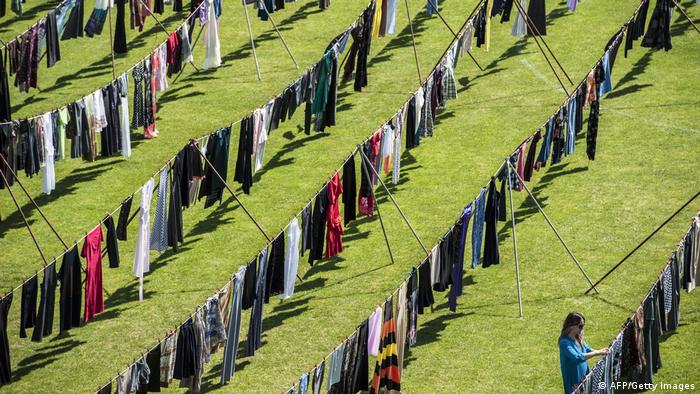Hundreds of women were raped during the war in Kosovo, speaking for the first Time about their suffering. A new study sees this crime as a tool of “ethnic cleansing”.

The Installation, “Thinking of You” by Alketa Xhafa Mripa is reminiscent of the victims
As a Serbian COP and raped, together with a civilian, asked Vasfije Krasniqi about to kill you. She was only 16, as the two men on the 14. In April 1998 from her parents ‘ house in the North of Kosovo is kidnapped. At the time, she wished for death as the only way out. “But the policeman answered: no, you’re staying alive, because then you will suffer even more,” said Vasfije Krasniqi in an Interview with Kosovo TV channel RTK. After the Kosovo war, they had contacted the interim administration of the United Nations mission in Kosovo (UNMIK), to file lawsuits against their tormentors. However, after three court cases, none of them was punished. The policeman is still a policeman.
The 36-year-old Vasfije Krasniqi lives now in Texas and has two children. In October, she returned to Kosovo to tell in a 25 minutes long TV-Interview your history.
It is estimated that thousands of people have suffered during the war in Kosovo (1998 to 1999), sexual violence. Unlike Vasfije Krasniqi, most did not dare to talk about it. But this is changing slowly: 278 female and two male victims have spoken after many years of silence with a trusted person of the NGO, Medica Gjakova in Kosovo openly about what happened to you. This non-governmental organization, registered and assisted victims of sexual violence during the Kosovo war.
On the basis of this information, the socio-explored a login and a policy analyst Anna Di Lellio this difficult topic. The Professor at New York University, lived for several years in Kosovo. Together with cook, Tina Kraja, a researcher from Kosovo, Mirlinda Sada, the Director of Medica Gjakova, she Recently published a study with the results in the magazine Prishtina Insight. “We can now show that the victims were raped in certain places and certain days – exactly there, where it came to mass murder,” says Anna Di Lellio in an interview with DW. “A total image, the murder of dozens, sometimes hundreds of men, and a roughly equal number of rapes, as well as burned down houses and mass expulsions. This is a picture of so-called ‘ethnic cleansing’, when homes destroyed, residents displaced, men are killed and women – and some men – are raped.” In their study, Anna Di Lellio also reminds us that “the crime of sexual violence in the war during the war in Bosnia was described for the first Time as a ‘weapon of war’”.

Solidarity with the raped women: The protest March “Be My Voice” in June in Pristina
“Rape as a war crime and a crime against humanity”
In a similar way, the victims in Kosovo have been raped “because of their ethnic origin, and humiliated,” says Anna Di Lellio. “What have they done to the Serbian police, military and para-military the Albanians in the Kosovo war, ethnic cleansing and rape was an Instrument that belonged to this strategy.” These rapes were “war crimes and crimes against humanity”.
The descriptions of the 280 Survivors have a lot in common: Always the talk is of multiple rapists, in addition, the victims were tortured, beaten, and with burning cigarette tormented. While they suffered this nightmare, they were also humiliated with phrases like: “you are Albanian women, so you can endure, you’re used to it!” or “We are going to show you what are the real Serbian men!”. Up to eleven Romani women and all other goods of the 280 victims who have spoken with Medica Gjakova, about their experiences of Albanian women and men. The perpetrators were all Serbian men, with the exception of an Albanian that has been charged by a Roma woman.
For the Survivors of the war has no end
During the war, the issue of sexual violence belonged to the public discourse, but in post-war Kosovo has been mostly quiet about it. The now deceased Sevdije Ahmeti, one of the leading Activists during the war, turned with 37 cases of sexual violence in UNMIK. At the institutional level, happened however nothing. Especially women’s rights organisations supported the victims and worked to identify these and to rehabilitate.
Watch Video 05:00 live Now 05:00 Min. 
Kosovo – independent and divided
Send Facebook Twitter google+ Tumblr VZ Mr. Wong Xing Newsvine Digg
Permalink https://p.dw.com/p/2sPEj
Kosovo – independent and divided
Five Survivors have said as a witness before the International criminal Tribunal for the former Yugoslavia (ICTY) in The Hague against accused Serbian security forces and the military. Only a single judgment also referred to the charge of sexual violence, in the case of the General Nebosja Pavkovic: “He would have to know of the rapes,” it said in the judgment, because the military have been reported in Serbia, “but he did nothing to stop it.” In three other similar cases, the accused were spoken to first, but later, on appeal, ultimately found guilty.
Between 2002 and 2014, has changed the perspective of the ICTY: The judges have started to take into account in the case of Kosovo the overall context of sexual violence – so mass expulsions, murder, and destruction. You referred to it as a “crime against humanity” and condemned the commander-in-chief, the had the allows.
For the victims of sexual violence, the war is not over yet. “And he will also never end, but for these people, as long as you live,” says Anna Di Lellio. “But we can help you by understanding what you have been through, and support you. Justice would of course be good, but it is hard to imagine that it happens to each of the victims. So many years have already passed. But it would be incredible, if Serbia would recognise what they have done to Serbs then Kosovo.”